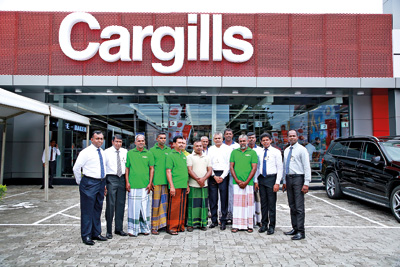Cargills to build 50 Food City stores annually from 2020
Cargills Ceylon Ltd established in 1844 during the colonial era which served the elite has now become a household consumer brand name throughout Sri Lanka. Since 36 years ago, the company has taken a sharp, positive turn in consumer marketing.

Cargills Deputy Chairman Ranjit Page (sixth from right) with senior staff and some farmers outside the newly opened Wattala outlet.
Through its Food City super-market concept that began in 1983 the company sells quality goods at fair prices and put a stop to fleecing the consumer by eliminating the middlemen through its spread of super-markets with altogether a different system of outsourcing vegetables, fruits, rice, meat, fish and other items by collecting from the farmer direct and selling them to the consumer through these outlets.
Last Saturday, Cargills Food City had an opportunity to reminisce their tremendous achievements when the company opened its 400th Food City store at Wattala. Cargills invited Sudath Kodikara, former CEO, who served the company for 30 years making Food City to grow to this proportion, to declare open its 400th store.
Ranjit Page, Deputy Chairman, Cargills speaking to the Business Times on the sidelines of the opening said that they are 175 years old and serving the nation. He said: “When you look at Cargills Food City you think of the brand ‘Cargills super market’ that is what you see outwardly. But I speak of the heart of Cargills that is touching the people’s lives, not just in Colombo, but throughout the nation”.
Continuing he added: “The heart of Cargills is to create markets for the rural and farming communities; the heart of Cargills is sustainable employment for the youth for a better life and to earn a decent wage”. He said that these young men and women are given good practical training in consumer marketing, which enables them not only to earn an income in Sri Lanka, but they would be able to work in overseas too.
He said that the country has given them an opportunity and the heart is: “We provide jobs to our youth and we create markets to our farmers” and we now are spread across all 25 districts of the country”.
He said that throughout 36 years they have created 400 Food City stores and to build another 400 stores they would not wait another 36 years but he said that the Chairman and the management have made a decision to build 50 stores each year beginning next year.
He said that their approach is multi-pronged providing best consumer marketing, uplifting farmers, creating markets and providing jobs, but above all their main thrust is to bring down the cost of living.
Mr Page noted that they have done many things for the farmers. When they started collecting produce by 1999, the company needed about 400 kg of vegetables a day, but today he said that account for 4 per cent of the national production, a massive achievement and the farmers are paid in cash.
They have studied the farming community as to why they cannot earn like other farmers elsewhere in the world and to overcome this debacle they got several of the farmers to visit India and gave them the opportunity to get training in the modern methods of farming. He said already more than 80 farmers have adopted the new method and earn a sizable income and some of them are on the road to become millionaires.
The new method, he indicated made the farmers to reduce the excessive use of fertilizer, use water economically and cut down pre and post-harvest losses. Cargills was heavily investing on these new farming systems and the programme would reach more than 1,000 farmers very soon.
Through these new ways they are contributing to food safety and this enables the local fruits and vegetable to be exported. While providing the local needs they are also in the process of exporting such items like milk products, meat, fruits and vegetable.
When asked whether their globally acclaimed role model of consumer marketing would be expanded to overseas, he said that they would, but first of all they would fulfill the needs of the local market.
He said that with the new farming methods introduced, the old loss making farming methods have been completely revamped.
Adopting the new method would cost around Rs. 500,000, but half of this cost Rs. 250,000 is awarded through Cargills Sarubima Fund as an outright grant. He said the Central Bank has allowed the farmer to obtain the balance Rs. 250,000 as a loan at a nominal 6.7 per cent interest.


